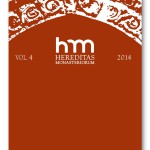Écrire l’histoire de la conquête: l’utilisation de l’histoire dans la polémique contre l’Ordre Teutonique au sujet des droitsdes infidèles (1386-1418)
Writing the history of the conquest: the use of history in the polemics against the Teutonic Knights on the rights of unbelievers (1386-1418)
Author(s): Loïc CholletSubject(s): History
Published by: Laboratoire de Recherches sur l'Histoire des Congregations et Ordres Religieux (LARHCOR)
Keywords: Jagiellonian Poland; Paweł Włodkowic; university of Cracow; Grand-Duchy of Lithuania; Samogitia; Teutonic Order; rights of non-Christian people; christianization; Late Middle Ages
Summary/Abstract: The aim of the article is to describe a research project devoted to the use of history in the debate on the rights of unbelievers, from the Christianisation of Lithuania to the Council of Constance. The geopolitical rivalry between the Order of the Teutonic Knights, King Jagiełło’s Poland and Witold’s Lithuania was accompanied by an intense “war of words” centred around the question of the rights of unbelievers and the legitimacy of the crusade against Lithuania. The use of historical topics during this “battle of idea” may have influenced the European elite with regard to the relations between Christian powers and non-Christian peoples as well as the issue of the activities of Teutonic Order. In the first part of the article, I ask how history was used by Polish and Lithuanian delegates in Constance to defend the idea of the unbelievers’ freedom. In addition to using legal arguments based mainly on medieval law, the disputants referred to historical facts, which was supposed to prove that the Teutonic Order had no legitimacy in fighting against the Baltic pagans. The second part of the article deals with the sources available for shaping a “Polish-Lithuanian” way of describing the history of the Baltic conquest by the Teutonic Knights. The third part of the article presents two prospective research projects concerning the use of history in the debates on the rights of unbelievers. The first is dedicated to the “long term” history of the Baltic conquest by the military orders; the idea is to demonstrate that similar problems regarding the rights of the pagans or converts appeared already in the 13th or 14th centuries. The second research idea focuses on pagan Samogitia. As Lithuania was trying to take over the province, local history was used by Polish and Lithuanian diplomats to prove that by their evil behaviour the Teutonic Knights failed to bring baptism to Samogitian pagans.
Journal: Hereditas Monasteriorum
- Issue Year: 2014
- Issue No: 4
- Page Range: 17-47
- Page Count: 31
- Language: French

